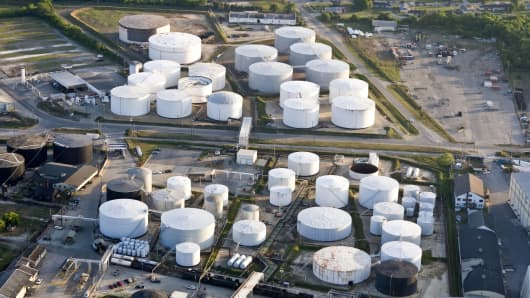Crude oil's biggest drop in two month's this week signals investors are deeply skeptical about whether recent stimulus efforts by global central banks — including last week's announcement by the U.S. Federal Reserve of a third round of quantitative easing — will have a meaningful impact on restoring growth, analysts and traders told CNBC.
The positive effect of the Fed's much-awaited stimulusannounced last week wore off more quickly than many thought in the oil markets, which are considered a leading indicator of future economic activity.
"The oil market is telling us there is not much faith in another round of QE," said John Licata, chief energy strategist for Blue Phoenix, an independent energy research and consulting company.
U.S. crude futures and the equivalent Brent benchmark hit four-month highs last Friday, boosted by Fed action earlier in the week. But a reversal came swiftly with U.S. crude dropping $7 a barrel in the past straight three sessions this week. An afternoon sell-off — $3 a barrel in a matter of minutes — on Monday was considered so precipitous it prompted an investigation by the U.S. regulators.
Rumors of a release of U.S. Strategic Petroleum Reserves were blamed for the price drop, though many said prices simply ran up too fast in the prior week creating "overbought conditions" that were now being adjusted as markets re-considered the merits of recent central bank stimulus.
"QE isn't goodfor stimulating the economy but it is good for commodities like oil," said Sean Hyman, editor of Ultimate Wealth Report. "The pullback was a good bit of profit taking in my opinion because most assets ran up so much over the past few sessions before that. I'm still bullish on oil."
'Chicken Feed'
Tom James, director and co-founder of Navitas Resources, said technical indicators looked "overbought" at the end of last week and added: "The muted reaction we could see in oil on the dollar drop after the Fed announcement last week was a warning that oil was struggling." Still, the medium-term and long-term trend is still intact, he said, "so buy the dip."
Sean Brodrick, Weiss Research natural resources analyst, correctly predicted Wednesday's "pullback to test support around $92 a barrel." October U.S. crude futures settled at $91.98 and he warned that the run of selling may not be over.
"In this market, which is delirious on the high-speed chicken feed of QE that Ben (Bernanke) is injecting into Wall Street's main vein, we could see a pullback to $89," Brodrick said.
Mike Harrowell, senior resource analyst at BBY, told CNBC Asia's “Squawk Box”on Thursday that "QE of itself means little."
"A declining U.S dollar is positive for U.S.-based dollar prices and that's about it,” he added. “The oil market is not driven by perceptions of debasement of currencies; it's driven by supply demand events. What I think you've seen quite clearly is the Saudis have come out to say that we will cap the oil price but around about these levels."
Harrowell touched upon a key point. The post-QE jump in oil prices seemed to spur Saudi Arabia, the de facto "central bank" of oil, into talking prices lower. Oil came under further pressure on Tuesday when a senior Gulf source said Saudi Arabia is working to lower oil prices, producing around 10 million barrels per day, Reuters reported. Ali al-Naimi, Saudi Arabia's oil minister, had said on Sept. 10 that the Organization of the Petroleum Exporting Countries' top exporter was worried about high oil price and would take steps to moderate them.
"The Saudis have made quite clear ... that this year they could produce between 12.5 and 12.7 million barrels a day," said Johannes Benigni, managing director of JBC Energy. "We have had heard Mr. Naimi say many times in spring this year that they could put that oil to work. So, for us it's pretty clear the Saudis are happy to produce 10."
Overall, the oil markets are showing a vote of no-confidence in stimulus in the short term, though the view is not unanimous. Kevin Kerr of Kerr Trading International described the recent price drop as "a hiccup," adding "cheap dollars sloshing around are long-term bullish, especially for energy."
—By CNBC's Sri Jegarajah


